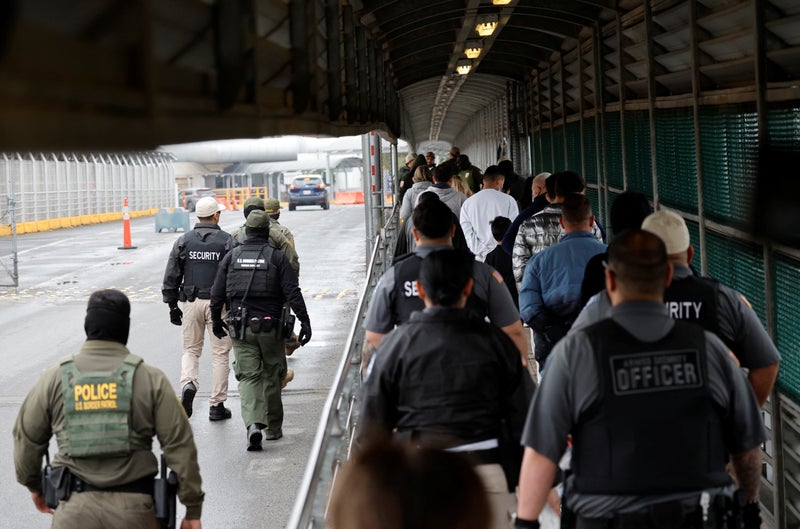Alien Enemies Act of 1798: What is obscure wartime law Donald Trump wants to use in deportations?
Alien Enemies Act of 1798: What is obscure wartime law Donald Trump wants to use in deportations?
Share:
The move could supercharge his mass deportation push and potentially sweep in people not charged with crimes. President Donald Trump is set to test the limits of his immigration crackdown by invoking a wartime law to deport immigrants alleged to be gang members without court hearings. The move could supercharge his mass deportation push and potentially sweep in people not charged with crimes. After taking office, Trump ordered military and immigration officials to be ready by 3 February 3 to implement the 1798 Alien Enemies Act, last used to justify internment camps for people of Japanese, German and Italian descent during World War Two.
![[The LAPD response as protesters block the Santa Ana Freeway during a demonstration in support of immigrants in Los Angeles, California, on 2 February]](https://static.independent.co.uk/2025/02/03/11/17/TOPSHOT-US-POLITICS-IMMIGRATION-igr6g5v1.jpeg)
The move — which would almost certainly face legal challenges — could allow him to bypass due process rights and rapidly remove migrants. Below is a look at the act and how it has been used in the past. The Alien Enemies Act was enacted in 1798 to combat spying and sabotage during tensions with France. It authorizes the president to deport, detain or place restrictions on individuals whose primary allegiance is to a foreign power and who might pose a national security risk in wartime.
The act states it can be invoked "whenever there is a declared war" or "any invasion or predatory incursion" that has been perpetrated, attempted or threatened against the United States by a foreign government. The act requires the president to publicly proclaim the event that prompted the act to be invoked. The act remains in effect until the president terminates it. The law was used in the War of 1812 between the United States and Britain and in both World Wars and was used to detain and deport individuals, as well as restrict their freedom.
President Woodrow Wilson used the act to bar citizens of enemies of the United States from possessing firearms and explosives, residing in certain areas and publishing certain materials, among other restrictions. President Franklin Roosevelt used the act to justify internment camps for people of Japanese, German and Italian descent during World War Two. President Harry Truman continued to use the act until 1951, after hostilities had ceased in World War Two, according to the Brennan Center for Justice.
Individuals have sued to challenge their detention or removal, but most of the cases have turned on questions of the person's citizenship. The act has been upheld as constitutional and the Supreme Court has said it can even be used after wartime. In 1948, the Supreme Court ruled the government could deport Kurt Ludecke, a former Nazi who fell out with the party, escaped a concentration camp and came to the United States, even though the war with Germany was over. The court said it would have been impractical to deport him while the war was going on.
Though some Democratic lawmakers in the US House and Senate reintroduced a bill in January that would repeal the Alien Enemies Act, pointing to its use in the internment of Americans and arguing it violates civil and individual rights. On 20 January, Trump ordered his administration to prepare to implement the Alien Enemies Act if he decided that foreign drug cartels in the United States qualified as an "invasion" or "predatory incursion" -- criteria for invoking the act.
That will raise the question of what qualifies as an invasion and who gets to decide. Courts have been asked similar questions before. California brought a lawsuit against the federal government in the 1990s claiming it was failing to protect the state from an invasion of individuals crossing the southern border illegally. The court decided that determining what constitutes an invasion was a political question for the other branches of government. The court also said that there was no manageable standard for determining when an influx of individuals rose to the level of an invasion.






















